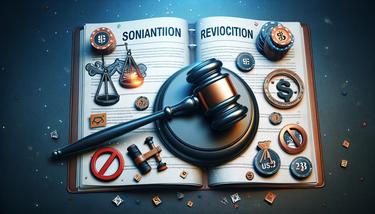What sanctions can be imposed on operators violating the rules and conditions of their gaming license?
Operators violating the rules and conditions of their gaming license[1] may face a range of sanctions[2], including fines, suspension or revocation of their license, and legal action. These sanctions are intended to ensure compliance[3] with regulatory standards, protect players, and maintain the integrity of the gambling industry. Regulators may also require corrective actions to address specific violations.
Key Facts
- Fines, suspension or revocation of license, and legal action.
- Sanctions ensure compliance and protect players.
- Regulators may require corrective actions for violations.
When operators violate the rules and conditions of their gaming license, regulatory bodies have the authority to impose a range of sanctions. These sanctions are designed to ensure compliance, protect consumers, and maintain the integrity of the gaming industry. The severity and nature of the sanctions depend on the extent of the violation, its impact on consumers, and whether it’s a repeat offense. Below, we outline the typical sanctions that can be enforced against non-compliant operators.
Warning and Reprimands
For minor violations or first-time offenses, regulatory bodies may issue warnings or reprimands to the operator. This is a formal acknowledgment of the violation, signaling to the operator that they need to rectify the issue. Warnings serve as a deterrent against future non-compliance and are often accompanied by a set period within which the operator must address the identified problems.
Fines and Financial Penalties
One of the most common sanctions for violations of gaming license conditions is the imposition of fines or financial penalties. The amount can vary widely depending on the severity of the violation, the jurisdiction’s regulatory framework[4], and whether the offense has occurred previously. Fines are meant to serve as both a punishment and a deterrent, ensuring that operators take their licensing conditions seriously.
Suspension of License
Regulatory authorities may opt to suspend an operator’s gaming license temporarily if they deem the violations to be serious but believe that the operator can rectify the issues within a specified timeframe. During the suspension, the operator is not allowed to conduct any gaming activities. This sanction serves as a strong incentive for operators to comply with regulatory requirements and to make necessary changes to their operations.
Revocation of License
In cases of severe non-compliance, repeated violations, or if an operator fails to amend issues after a suspension, regulatory bodies may revoke the gaming license altogether. Revocation is the most severe penalty and effectively shuts down the operator’s legal gaming operations within the jurisdiction. This sanction is reserved for the most egregious violations that undermine the integrity of the gaming industry and harm consumer interests.
Mandatory Audits and Operational Restrictions
Regulatory authorities may require operators to undergo mandatory audits to assess compliance with licensing conditions. These audits can be both financial and operational. Additionally, operators may be subjected to operational restrictions, such as limits on the types of games offered, advertising restrictions[5], or enhanced monitoring of their operations. These measures ensure ongoing compliance and can be used in conjunction with other sanctions.
Compulsory Training and Implementation of Compliance Programs
Operators may be required to undertake compulsory training for their staff to ensure they understand their legal obligations and the conditions of their license. Regulatory bodies might also mandate the implementation of compliance programs designed to prevent future violations. These programs often include regular reviews, internal audits, and reporting mechanisms to ensure that operators continuously adhere to regulatory standards.
Settlement Agreements
In some cases, regulators and operators may enter into settlement agreements as a way to resolve violations. These agreements typically involve the operator agreeing to pay a fine, implement certain measures to prevent future violations, or both. Settlement agreements can be an effective way for both parties to avoid lengthy legal disputes and ensure swift compliance.
In conclusion, the sanctions for violating gaming license rules and conditions vary significantly but are all aimed at ensuring compliance, protecting consumers, and upholding the integrity of the gaming industry. Operators are strongly incentivized to adhere to their licensing conditions to avoid these potentially severe penalties.
- Gaming license — A permit issued by regulatory authorities allowing an entity to legally operate a gambling business, including online casinos, sports betting, and other gaming activities.
- Sanctions — Penalties imposed on gambling operators for non-compliance with regulatory standards or laws.
- Compliance — The act of adhering to legal standards and regulations established by governmental bodies and regulatory agencies, particularly in the context of financial operations and transactions involving cryptocurrencies.
- Regulatory Framework — A set of regulations and guidelines established by authorities that govern the operation of financial markets and instruments.
- Advertising Restrictions — Regulations that limit or dictate the manner in which gambling services can be marketed to prevent misleading or aggressive advertising practices.
- Gambling Commission. 'Compliance and Enforcement.'
- Malta Gaming Authority. 'Enforcement Measures.'

